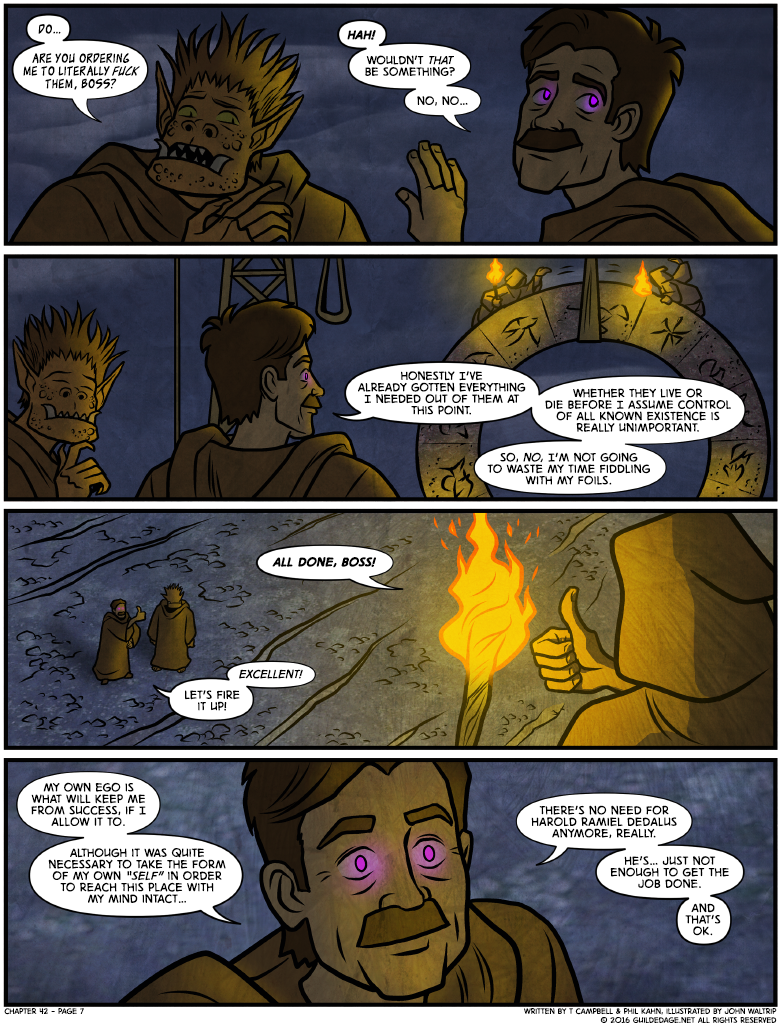Annotated 42-7
 Hey, don’t feel too overwhelmed by these marching orders, panel 1 Ulak. As long as you conceal your Cultist loyalties, you’ve got a shot with Frigg. It ain’t happening with E-Merl, but you could probably give WAV a helmet-noogie and convince him that was sex. I wouldn’t rule out Sundar… If you get to Syr’Nj before she finds out Byron’s alive, she may be stressed enough… I’m mostly joking with those last two, although this all gets more plausible if you’ve got access to some kind of glamour spell. I’m sure your new boss could hook a brother up with one of those. Just don’t use it to mimic Rachel to E-Merl, or he will literally kill you.
Hey, don’t feel too overwhelmed by these marching orders, panel 1 Ulak. As long as you conceal your Cultist loyalties, you’ve got a shot with Frigg. It ain’t happening with E-Merl, but you could probably give WAV a helmet-noogie and convince him that was sex. I wouldn’t rule out Sundar… If you get to Syr’Nj before she finds out Byron’s alive, she may be stressed enough… I’m mostly joking with those last two, although this all gets more plausible if you’ve got access to some kind of glamour spell. I’m sure your new boss could hook a brother up with one of those. Just don’t use it to mimic Rachel to E-Merl, or he will literally kill you.
HR’s attitude here makes me wonder. Is there a viable alternate reality where he became a benevolent sort of god? We obviously never considered this option, because it would mean that our biggest villain just sort of took care of himself as a threat, without our heroes having to lift a finger. Even if we consider the story as HR’s story, such a transformation would feel unearned after his sins. But all this talk of letting go of himself and his old grudges makes me think, what was stopping him? Was his personal growth limited only by the constraints of the kind of story we were telling?
Fun to think about, but I’m gonna say “no.” Pride and greed are so fundamental to who HR is that I think his attempts to get away from them are ironic and doomed. It’s like certain tragic soliloquies where characters speak as if they have more options than their personalities will give them. “To be or not to be?” SPOILER: IT’S GONNA BE “NOT TO BE.”











The first thing that I really like about this page was thr simple confusion from Ulak when he came across our swears.
Too many “fantasy” or “mythological” or even “historical” stories are all about fuck, shit and motherfucker, when in any likelihood those would not have developed into swears in the realms given.
The new Castlevania was awesomely animated, had cool effects, not too bad voicing… And then every single character was “fuck this, fuck that” in exactly same manner a small kid yells PENIS! and runs away giggling. It was so unimaginative and lazy. Granted, people loved it, so maybe I’m in the wrong for expecting SOME class…
But also the fact that H.R. probably could have worked it out as benevolent god. Sure, he was going to remake all existence in his image, but… What god haven’t? And what if it worked?
Nowadays we are just so hung on “good” meaning that everyone gets to live, everyone gets something, everyone must be happy all the time, or else we are evil.
Heck, you can’t even be happy if you haven’t been or understood another’s misery. That’s why we have so many goldspoon fed idiots who don’t understand how some people can go hungry or homeless. We need bad things to give proper reflection to all that is good.
See, I could more or less agree with you until that last part. Because if someone has to suffer, who decides who gets the short stick? Because if you tell people someone has to carry that burden, plenty will say they don’t want to, and that would be reasonable. And then you get to pressent day, where there’s always the same people saying who should suffer and who doesn’t. And what a coincidence that it is never them, who have the power and resources. We have powerful minds snd emotions, enough to understand suffering without having it literally replicated in reality around us. That “contrast” doedn’t need to exist outside ourselves for us to care and protect one another, for us to recognize the good things in life.
And at the same time we have a huge number of people “fighting for the right cause” “with” people who really need to be fought for. And plenty ignoring the people whom they are “fighting for”, when they have completely missed the idea what the fight was all about, having understood it only through their own lens.
Sure, we do understand suffering by proxy. That’s why we want to help. But it’s not even near guarantee.
Also people needing to suffer to understand what enjoying is doesn’t mean that the same people need to suffer, let alone that others might enjoy due to that. That’s again one people only knowing one thing and others another without either with any chance understanding their own lot due to lack of the other.
There’s a reason why the worst thing you can give in hell is a glimpse of heaven.
We already have starving kids that are perfectly happy playing that a rock is a camera, where as another is crying because their newest iPhone was the wrong colour. And in their cases the child with the rock might not benefit from getting to play with an iPhone for a moment, but the kid with the iPhone would definitely benefit from being forced to play with the rock for a moment. And that’s still being evil, no matter if “for the right reason”. We are purposefully making someone more miserable for a moment and that’s a-ok.
Funny thing that HR was so inspired by Plato’s allegory of the cave, when in it Plato concludes that the truly enlightened, who ought to become the rulers of society, would conversely, because of their enlightenment, not wish to be rulers.
Perhaps people who are likely to grasp for the power of godhood are also likely to be too greedy to become truly benevolent deities?
Perhaps, truly benevolent omnipotent rulers cannot exist? (Not related to gods who were never people, just gods — whose existence IRL is not of concern here)
Any human, given unlimited power, will sooner or later lose contact with the people they’re wielding that power over, as their reality will become divorced from everyone else’s. No amount of prior benevolence can save them — unless their first act is some sort of Odyssean pact which ensures that their omnipotence is limited in some way, it can’t work.
That is what Glaucon argued in the story of the Ring of Gyges. Socrates (the character, however much he did or did not actually resemble any teacher of Plato’s) argued the opposite: that choosing not to abuse power over others was both possible and necessary for anyone to have both power and happiness.
Absolutely, choosing not to abuse power is possible and necessary — but not indefinitely.
It also becomes a lot easier not to abuse power if you know that you will go back to being ruled after some defined amount of time, and someone else will take your place. If you know, however, that the only way for you to lose your power is by being killed by some challenger, you suddenly become a lot more concerned with keeping that power than you would otherwise be, which automatically makes you less concerned with other people’s well-being.
That’s an unavoidable consequence, no matter your character or intentions.
Anyone attempting to be benevolent, given enough power, will eventually have to confront the possibility that a failure to act is morally wrong in some cases. This eventually leads to the question of how much agency is it morally correct to deny others, which doesn’t really have a good, human-conceivable answer.
I think HR’s ascension to godhood absolutely precludes any possibility of becoming a being deity. Once you have decided that the lives of other people are irrelevant or an obstacle to reaching power… why would acquiring said power change your mind? Evil has already proven both efficient and palatable, so what else would there be to do once you have reached the cusp and there’s nothing else for you to pursue but the exercise of your power over the ones beneath you?
benign deity*
I was in a DND campaign once where liche-necromancers ruled most of the world, and there was this one wizard who was resisting them. He was, it turned out, a lich himself. And he had done the necessary evil acts. He hadn’t just sacrificed himself, but others. That moral plunge obviously wracked him and it was very much a case of good intentions gone bad. Unlike Heisenberg/Walter White, he knew it, and was now a cruel creature who was only trying to “save the world” out of respect for the person he used to be. The person he sacrificed for power. Lawful evil, acting good for a little while.
Tragically, good undead were technically a thing in the setting. Ancient guardians who sacrificed themselves not for their own goals, but for the good of the community. None were around in our campaign. Did he not know about the elven rites, or did he lust for immortal power in his heart?
He followed his own code and helped us, then disappeared. As far as we know, that was the last of the person he was. And the unleashing of a particularly wise lich.
I think even now, HR had the potential to turn benevolent. But there’s no way he could do that and attain his godhood. The desire to do so stems from the helplessness he felt for the first half of the Sepia World story, and his path away from that helplessness is soaked in blood. He can’t keep walking this same path and make that change. Without someone who can break through to him and call him out for his bullshit, to tear down the rationalizations he’s built up since, he’s stuck in this amoral mindset that he’s really only built up to get away from that broken helplessness.
Maybe he could have gotten around to it some decades, centuries after getting there, when he’s conquered everything that used to bother him and finally settled down. When there’s nothing left to distract him from self-reflection. But by then, he’d have slaughtered every other character anyway, so it’d come far too late for them – and for the story.